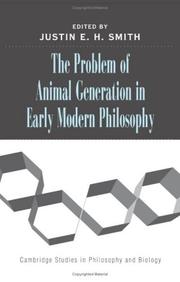| Listing 1 - 10 of 62 | << page >> |
Sort by
|
Book
ISBN: 9780691163277 0691163278 Year: 2016 Publisher: Princeton : Princeton University Press,
Abstract | Keywords | Export | Availability | Bookmark
 Loading...
Loading...Choose an application
- Reference Manager
- EndNote
- RefWorks (Direct export to RefWorks)
"What would the global history of philosophy look like if it were told not as a story of ideas but as a series of job descriptions--ones that might have been used to fill the position of philosopher at different times and places over the past 2,500 years? The Philosopher does just that, providing a new way of looking at the history of philosophy by bringing to life six kinds of figures who have occupied the role of philosopher in a wide range of societies around the world over the millennia--the Natural Philosopher, the Sage, the Gadfly, the Ascetic, the Mandarin, and the Courtier. The result is at once an unconventional introduction to the global history of philosophy and an original exploration of what philosophy has been--and perhaps could be again. By uncovering forgotten or neglected philosophical job descriptions, the book reveals that philosophy is a universal activity, much broader--and more gender inclusive--than we normally think today. In doing so, The Philosopher challenges us to reconsider our idea of what philosophers can do and what counts as philosophy"--
Philosophy --- Philosophers --- Philosophie --- Philosophes --- Philosophie. --- Philosophes. --- Philosophers. --- History.

ISBN: 9781107407282 1107407281 9780521840774 0521840775 9780511498572 110716284X 9786610480319 051122060X 0511221045 0511316933 0511498578 1280480319 0511219059 0511219733 Year: 2006 Publisher: Cambridge ; New York : Cambridge University Press,
Abstract | Keywords | Export | Availability | Bookmark
 Loading...
Loading...Choose an application
- Reference Manager
- EndNote
- RefWorks (Direct export to RefWorks)
In this volume Smith examines the early modern science of generation, which included the study of animal conception, heredity, and fetal development. Analyzing how it influenced the contemporary treatment of traditional philosophical questions, it also demonstrates how philosophical pre-suppositions about mechanism, substance, and cause informed the interpretations offered by those conducting empirical research on animal reproduction. Composed of essays written by an international team of leading scholars, the book offers a fresh perspective on some of the basic problems in early modern philosophy. It also considers how these basic problems manifested themselves within an area of scientific inquiry that had not previously received much consideration by historians of philosophy.
Génétique animale --- Reproduction --- Animaux --- Histoire. --- Évolution --- Philosophie --- Animalité (philosophie) --- 1500-1800 --- Animaux domestiques --- Embryologie --- Reproduction. --- Domestic animals --- Animals (Philosophy) --- Embryology. --- Animaux (Philosophie) --- 1500-1800. --- Embryology --- Amphimixis --- Generation --- Pangenesis --- Procreation --- Animal embryology --- Animals --- Development, Embryological --- Development, Embryonic --- Development, Zygotic --- Embryogenesis --- Embryogeny --- Embryological development --- Embryonic development --- Zoology --- Zygote development --- Zygotes --- Zygotic development --- Zygotic embryogenesis --- Development --- Biology --- Life (Biology) --- Physiology --- Sex (Biology) --- Generative organs --- Theriogenology --- Developmental biology --- Morphology (Animals) --- Embryos --- Philosophy --- Reproduction (biologie) --- Arts and Humanities --- Domestic animals - Reproduction. --- Animalité (philosophie)

ISBN: 9780735623064 Year: 2007 Publisher: Redmond : Microsoft,
Abstract | Keywords | Export | Availability | Bookmark
 Loading...
Loading...Choose an application
- Reference Manager
- EndNote
- RefWorks (Direct export to RefWorks)
Inhoudsopgave : 1.Introduction to WCF2.WCF in the channel layer3.WCF in the servicemodel layer
Book
Year: 2000 Publisher: Oxford University of Oxford, Department of Economics
Abstract | Keywords | Export | Availability | Bookmark
 Loading...
Loading...Choose an application
- Reference Manager
- EndNote
- RefWorks (Direct export to RefWorks)
Book
ISBN: 9780691141787 Year: 2011 Publisher: Princeton, N.J. Princeton University Press
Abstract | Keywords | Export | Availability | Bookmark
 Loading...
Loading...Choose an application
- Reference Manager
- EndNote
- RefWorks (Direct export to RefWorks)
Though it did not yet exist as a discrete field of scientific inquiry, biology was at the heart of many of the most important debates in seventeenth-century philosophy. Nowhere is this more apparent than in the work of G. W. Leibniz. In Divine Machines, Justin Smith offers the first in-depth examination of Leibniz's deep and complex engagement with the empirical life sciences of his day, in areas as diverse as medicine, physiology, taxonomy, generation theory, and paleontology. He shows how these wide-ranging pursuits were not only central to Leibniz's philosophical interests, but often provided the insights that led to some of his best-known philosophical doctrines.Presenting the clearest picture yet of the scope of Leibniz's theoretical interest in the life sciences, Divine Machines takes seriously the philosopher's own repeated claims that the world must be understood in fundamentally biological terms. Here Smith reveals a thinker who was immersed in the sciences of life, and looked to the living world for answers to vexing metaphysical problems. He casts Leibniz's philosophy in an entirely new light, demonstrating how it radically departed from the prevailing models of mechanical philosophy and had an enduring influence on the history and development of the life sciences. Along the way, Smith provides a fascinating glimpse into early modern debates about the nature and origins of organic life, and into how philosophers such as Leibniz engaged with the scientific dilemmas of their era. This book provides a comprehensive survey of G. W. Leibniz's deep and complex engagement with the sciences of life, in areas as diverse as medicine, physiology, taxonomy, generation theory, and paleontology. It is shown that these sundry interests were not only relevant to his core philosophical interests, but indeed often provided the insights that in part led to some of his most familiar philosophical doctrines, including the theory of corporeal substance and the theory of organic preformation.
Leibniz, von, Gottfried W. --- Philosophie et sciences --- Sciences de la vie --- Life sciences --- Science --- Philosophie --- Philosophy --- History --- Leibniz, Gottfried Wilhelm, --- Et les sciences --- Knowledge --- Science. --- History & Surveys --- Modern --- Philosophy & Social Aspects --- PHILOSOPHY / History & Surveys / Modern --- SCIENCE / Philosophy & Social Aspects --- SCIENCE / History --- Sciences --- Histoire --- Modern. --- Philosophy & Social Aspects. --- History. --- Biosciences --- Sciences, Life --- Leibnitz, Gottfried Wilhelm --- Leibniz, Gottfried Wilhelm --- Et les sciences.
Book
ISBN: 9780691153643 Year: 2015 Publisher: Princeton, N.J. Princeton University Press
Abstract | Keywords | Export | Availability | Bookmark
 Loading...
Loading...Choose an application
- Reference Manager
- EndNote
- RefWorks (Direct export to RefWorks)
"People have always been xenophobic, but an explicit philosophical and scientific view of human racial difference only began to emerge during the modern period. Why and how did this happen? Surveying a range of philosophical and natural-scientific texts, dating from the Spanish Renaissance to the German Enlightenment, Nature, Human Nature, and Human Difference charts the evolution of the modern concept of race and shows that natural philosophy, particularly efforts to taxonomize and to order nature, played a crucial role. Smith demonstrates how the denial of moral equality between Europeans and non-Europeans resulted from converging philosophical and scientific developments, including a declining belief in human nature's universality and the rise of biological classification. The racial typing of human beings grew from the need to understand humanity within an all-encompassing system of nature, alongside plants, minerals, primates, and other animals. While racial difference as seen through science did not arise in order to justify the enslavement of people, it became a rationalization and buttress for the practices of trans-Atlantic slavery. From the work of François Bernier to G.W. Leibniz, Immanuel Kant, and others, Smith delves into philosophy's part in the legacy and damages of modern racism. With a broad narrative stretching over two centuries, Nature, Human Nature, and Human Difference takes a critical historical look at how the racial categories that we divide ourselves into came into being"--
Philosophy of nature --- History of philosophy --- Philosophy of science --- Philosophical anthropology --- Race --- Ethnicity --- Philosophy of nature. --- Science --- Evolution (Biology) --- Philosophy --- History --- Social science --- Philosophy. --- History & Surveys --- General. --- Social History. --- Discrimination & Race Relations. --- History. --- PHILOSOPHY / History & Surveys / General. --- HISTORY / Social History. --- SOCIAL SCIENCE / Discrimination & Race Relations. --- SCIENCE / History. --- Ethnicité --- Philosophie de la nature --- Sciences --- Evolution (Biologie) --- Philosophie --- Evolution (Biology). --- Philosophie des sciences --- Évolution (biologie) --- Ethnicité --- Philosophie de la nature. --- Philosophie des sciences. --- Philosophie. --- Évolution (biologie)

ISBN: 0821825887 9780821825884 Year: 1994 Volume: 524 Publisher: Providence, R.I. American Mathematical Society
Abstract | Keywords | Export | Availability | Bookmark
 Loading...
Loading...Choose an application
- Reference Manager
- EndNote
- RefWorks (Direct export to RefWorks)
Topology --- Cobar construction (Topology) --- Loop spaces --- Tensor products --- Produits tensoriels --- Espaces de lacets --- Produits tensoriels. --- Espaces de lacets.

ISBN: 0861871014 Year: 1990 Publisher: London : Pinter,
Abstract | Keywords | Export | Availability | Bookmark
 Loading...
Loading...Choose an application
- Reference Manager
- EndNote
- RefWorks (Direct export to RefWorks)
Labor disputes --- Strikes and lockouts --- Travail --- Grèves et lock-out --- Conflits --- Attlee, C.R. --- Churchill, Winston, --- Great Britain --- Grande-Bretagne --- Economic policy --- Politique économique --- Government policy --- Grèves et lock-out --- Politique économique
Book
ISBN: 9780190490454 9780190490447 9780190490478 9780190490461 Year: 2017 Publisher: New York, N.Y. Oxford University Press
Abstract | Keywords | Export | Availability | Bookmark
 Loading...
Loading...Choose an application
- Reference Manager
- EndNote
- RefWorks (Direct export to RefWorks)
Embodiment-defined as having, being in, or being associated with a body-is a feature of the existence of many entities, perhaps even of all entities. Why entities should find themselves in this condition is the central concern of the present volume. The problem includes, but also goes beyond, the philosophical problem of body: that is, what the essence of a body is, and how, if at all, it differs from matter. On some understandings there may exist bodies, such as stones or asteroids, that are not the bodies of any particular subjects. To speak of embodiment by contrast is always to speak of a subject that variously inhabits, or captains, or is coextensive with, or even is imprisoned within, a body. The subject may in the end be identical to, or an emergent product of, the body. That is, a materialist account of embodied subjects may be the correct one. But insofar as there is a philosophical problem of embodiment, the identity of the embodied subject with the body stands in need of an argument and cannot simply be assumed. The reasons, nature, and consequences of the embodiment of subjects as conceived in the long history of philosophy in Europe as well as in the broader Mediterranean region and in South and East Asia, with forays into religion, art, medicine, and other domains of culture, form the focus of these essays. More precisely, the contributors to this volume shine light on a number of questions that have driven reflection on embodiment throughout the history of philosophy. What is the historical and conceptual relationship between the idea of embodiment and the idea of subjecthood? Am I who I am principally in virtue of the fact that I have the body I have? Relatedly, what is the relationship of embodiment to being and to individuality? Is embodiment a necessary condition of being? Of being an individual? What are the theological dimensions of embodiment? To what extent has the concept of embodiment been deployed in the history of philosophy to contrast the created world with the state of existence enjoyed by God? What are the normative dimensions of theories of embodiment? To what extent is the problem of embodiment a distinctly western preoccupation? Is it the result of a particular local and contingent history, or does it impose itself as a universal problem, wherever and whenever human beings begin to reflect on the conditions of their existence? Ultimately, to what extent can natural science help us to resolve philosophical questions about embodiment, many of which are vastly older than the particular scientific research programs we now believe to hold the greatest promise for revealing to us the bodily basis, or the ultimate physical causes, of who we really are?
History of civilization --- Metaphysics --- Philosophy and psychology of culture --- Philosophical anthropology --- Philosophy of science --- Human body (Philosophy) --- Corps (philosophie) --- Métaphysique --- Mind and body --- Esprit et corps --- Human body (Philosophy). --- Métaphysique. --- Esprit et corps. --- Métaphysique.
Book
ISBN: 9780567656605 9780567656612 0567656608 Year: 2015 Volume: 518 Publisher: London Bloomsbury
Abstract | Keywords | Export | Availability | Bookmark
 Loading...
Loading...Choose an application
- Reference Manager
- EndNote
- RefWorks (Direct export to RefWorks)
226 --- Evangelies. Handelingen der apostelen:--algemeen --- Bible. --- Evangelie (Book of the New Testament) --- Fukuinsho (Books of the New Testament) --- Gospels (Books of the New Testament) --- Gospels, Synoptic (Books of the New Testament) --- Synoptic Gospels (Books of the New Testament) --- Criticism, interpretation, etc. --- Church history --- Bible --- Criticism, interpretation, etc --- Church history - Primitive and early church, ca. 30-600 - Sources.
| Listing 1 - 10 of 62 | << page >> |
Sort by
|

 Search
Search Feedback
Feedback About UniCat
About UniCat  Help
Help News
News